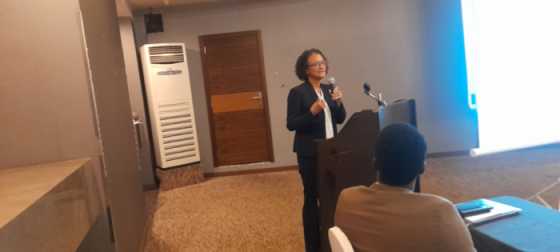Liberia: “We Are Committed to Supporting Liberia’s Private Sector”

— IFC Resident Representative asserts
The International Finance Corporation (IFC) Resident Representative, Alexandra Celestin, says that her institution is committed to supporting Liberia’s private sector investment.
She said over the years, the IFC has invested hundreds of millions in technical assistance and investment in the country as well as several sectors including agribusiness, finance and manufacturing, among others.
However, IFC’s strategy involves supporting Liberia’s economic recovery by helping improve the investment climate, strengthening the financial sector, supporting private participation in infrastructure, and financing selected private sector companies.
Celestin stated that the IFC is helping Liberia reform its investment climate, attract and promote quality investment, and galvanize the growth of small and medium enterprises.
She said, "So, we are really committed to supporting the private sector in Liberia and this kind of discussion around national payment."
Celestin made the remarks on Wednesday, January 25, at the close of a two market-level workshop on business models of the National Payment System and functioning of the National Payment Council (NPC).
The NPC, when enacted, will provide guidance to the country banking reform process by the Central Bank of Liberia working on infrastructural balances between banking entities in regard to settling direct credit, debits and others.
She, however, stated that the just ended workshop jointly organized by the IFC and the CBL is part of the many capacity building projects aimed at improving financial practices in the country.
According to Celestin, the discussion around the national payment system is a healthier one for Liberia and the banking institutions need to make use of the payment council.
She believed that the recent engagement of stakeholders on the market-level workshop on business models of the NPC and functioning of the National Payment Council will benefit financial inclusion and key strategic areas for them in Liberia.
For her part, the Director for Payment Systems at the Central Bank of Liberia, Miatta Kuteh, explained to participants about the role played by them in effectuating payment systems across the country.
Kuteh said the banker’s bank CBL is working for all financial institutions, and also hoping that commercial banks make use of the National Payment Council.
She explained, "It is equally binding on the Central Bank to have the Payment Council so we had the national payment system forum in 2018; that is where the NPC was bred and the council chapter was developed."
According to her, the NPC is going to be responsible for making policy decisions or recommendations pertaining to all matters concerning the national payment system.
Celestin said that the discussion around pricing has been overlooked in Liberia but is key because it determines how you expand your services, determine how consumers are satisfied and protected.
"We are all into this process together and we need the effort of all banking and even non-banking institutions to have it getting an expected result," she added.
On the mandate of the national payment council, Kuteh said, the Council will provide a strategic document that will articulate the framework for the implementation of the national payment system in Liberia.
"If you look at our financial inclusion strategy, there are three critical pillars and one is on the digital financial services pillar that promotes total financial inclusion," she intimated.
"We all in this room can recall that the CBL is currently engaged with its partners to implement our instant payment, upgrade our legacy payment system to ensure that we move by the end of 2023 from 37.5% financial inclusion to 50%.” Kuteh continued, "So, based on this financial inclusion objective, the CBL engaged its partners to support the provision of infrastructure, review of the legal and regulatory framework as well as build the ecosystem capacity to promote digital financial services in Liberia."
For their parts, the participants then lauded the IFC and the CBL for the workshop and recommended basic institutional interest so as to ensure that the National Payment Council does not become a failed reality at the point in time that many banks will start to follow its programs.
Meanwhile, the two-day workshop brought together scores of participants from key financial institutions including the Liberia Bank for Development and Investment (LBDI), United Bank for Africa (UBA), SIB, Ecobank, Citi Trust Bank, and Access Bank.
Others are Lonestar Cell MTN, LRA, the Liberia Chamber of Commerce, the World Bank, and Activa Insurance Company, among others. It was supported by the Swedish government.
